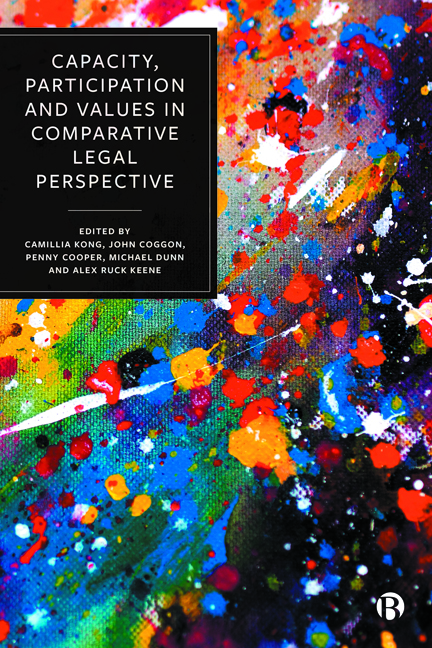Book contents
- Frontmatter
- Contents
- List of Tables and Boxes
- Notes on Contributors
- Acknowledgements
- 1 Introduction: Values, Participation and Mental Capacity Laws in International Comparative Perspective
- 2 Mental Capacity Law in England and Wales: A Value-Laden Jurisdiction
- 3 Mental Capacity Regimes Approach to Values and Participation in Proceedings Involving Individuals with Impaired Decision-Making Capacity in Scotland
- 4 The Fusion Approach to Mental Capacity Law in Northern Ireland: Possibilities and Challenges
- 5 Judging Values in a Time of Transition: An Irish Perspective
- 6 US Laws Relating to Decision-Making on Behalf of P
- 7 Indigenous Peoples with Disabilities and Canadian Mental Capacity Law
- 8 Capacity, Participation and Values in Australian Guardianship Laws
- 9 Navigating Values in Aotearoa New Zealand
- 10 Values and Participation of Individuals Without Mental Capacity in Hong Kong
- 11 Asian Values and Confucianism: How P’s Ability to Participate in Court Proceedings in Singapore Is Influenced by P’s Cultural Milieu
- 12 Respect for the Will and Preferences of People with Mental Disorders in German Law
- 13 The Place of Values and P’s Participation in Mental Capacity Law: Themes, Synergies and Tensions
- Index
10 - Values and Participation of Individuals Without Mental Capacity in Hong Kong
Published online by Cambridge University Press: 18 January 2024
- Frontmatter
- Contents
- List of Tables and Boxes
- Notes on Contributors
- Acknowledgements
- 1 Introduction: Values, Participation and Mental Capacity Laws in International Comparative Perspective
- 2 Mental Capacity Law in England and Wales: A Value-Laden Jurisdiction
- 3 Mental Capacity Regimes Approach to Values and Participation in Proceedings Involving Individuals with Impaired Decision-Making Capacity in Scotland
- 4 The Fusion Approach to Mental Capacity Law in Northern Ireland: Possibilities and Challenges
- 5 Judging Values in a Time of Transition: An Irish Perspective
- 6 US Laws Relating to Decision-Making on Behalf of P
- 7 Indigenous Peoples with Disabilities and Canadian Mental Capacity Law
- 8 Capacity, Participation and Values in Australian Guardianship Laws
- 9 Navigating Values in Aotearoa New Zealand
- 10 Values and Participation of Individuals Without Mental Capacity in Hong Kong
- 11 Asian Values and Confucianism: How P’s Ability to Participate in Court Proceedings in Singapore Is Influenced by P’s Cultural Milieu
- 12 Respect for the Will and Preferences of People with Mental Disorders in German Law
- 13 The Place of Values and P’s Participation in Mental Capacity Law: Themes, Synergies and Tensions
- Index
Summary
Introduction
Mental capacity law in Hong Kong, much like most areas of law pertaining to those with mental disability, is riddled with deficiencies, both in terms of its theoretical basis and the problematic values that underpin its regimes. This chapter examines the latter, exploring in particular the role of the subjective values of the individual without capacity, as well as the participation of such individuals in hearings granting the power to make decisions on their behalf. The chapter begins with a brief introduction to the two key mental capacity law regimes in Hong Kong, the Part II Committee regime and the Part IVB adult guardianship regime of the Mental Health Ordinance (Cap 136) (MHO). It then examines the extent to which the views and wishes of the individual without capacity are ascertained and considered in decisions under both regimes. The chapter further considers whether such individuals take part in these decisions, and where they do, what the nature of this participation involves. A critical evaluation of these aspects of the two regimes is then provided, and the chapter ends with a brief conclusion.
Overview of legislative framing
Definitions
The MHO is the primary piece of legislation that regulates matters relating to persons with mental disability, with many of its provisions inherited from various versions of the Mental Health Act in the UK. The MHO approach to mental capacity is highly piecemeal in nature, with separate regimes regulating different aspects of an individual's affairs, as will be discussed further later in this chapter. While the concept of ‘mental incapacity’ is defined at the outset, the relevant definitions fail to include a general functional capacity test, although various functional capacity tests are then included in the different regimes to assess the individual's decision-making ability in those particular contexts.
Under the MHO, mental incapacity is defined in s 2 with two similar and equally problematic terms. The first is ‘mental incapacity’, which is defined as ‘mental disorder or mental handicap’. This definition incorrectly equates mental incapacity with mental disability, with no functional capacity test to assess the decision-making ability of the individual in question, as already mentioned.
- Type
- Chapter
- Information
- Publisher: Bristol University PressPrint publication year: 2023

